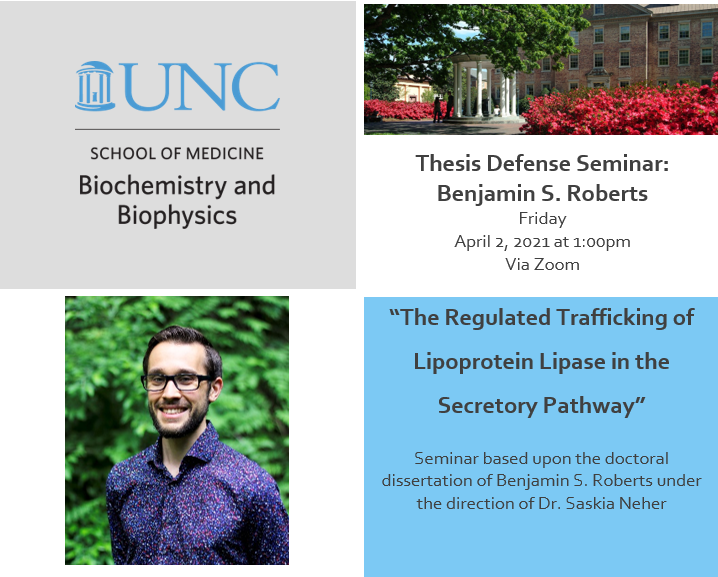
- This event has passed.
Student Thesis Defense: Benjamin S. Roberts (Neher lab)
April 2, 2021 @ 1:00 pm - 2:00 pm

Defense title: “The Regulated Trafficking of Lipoprotein Lipase in the Secretory Pathway”
Seminar based upon the doctoral dissertation of Benjamin S. Roberts under the direction of Dr. Saskia Neher
Abstract
Lipoprotein lipase (LPL) is a secreted enzyme required for the clearance of triglyceride (TG)-rich lipoproteins such as chylomicrons and VLDL from circulation. In response to feeding and fasting states, LPL is released from muscle and adipose tissue and trafficked to the capillaries. Loss of LPL activity due to inactivating mutations or aberrant cell signaling ultimately leads to high plasma TGs, which can raise the risk of developing cardiovascular disease, pancreatitis, and other life-threatening pathologies. Furthermore, LPL deficiency is a comorbidity in patients with type 2 diabetes because aberrant cell signaling dysregulates LPL activity. Whereas the regulation of circulating LPL is well-described, the physiological regulation of LPL in the secretory pathway remains unclear. Thus, we have endeavored to describe the regulation of LPL maturation in the early secretory pathway, and regulated LPL trafficking in the late secretory route. Herein we have used microscopy and biochemical tools to describe novel aspects of LPL biosynthesis in the endoplasmic reticulum (ER) and insulin-dependent LPL trafficking in the late secretory pathway.
LPL trafficking begins in the ER, where LPL maturation involves a host of chaperones including lipase maturation factor 1 (LMF1). We found that LMF1 participates in oxidation/reduction (redox) reactions that are required for the formation of disulfide bonds within LPL. In cells, LMF1-deletion caused oxidation of the ER and the formation of disulfide-dependent LPL aggregates which are unable to exit the ER. Mature folded LPL is able to exit the ER and traffics to the Golgi apparatus where it awaits exocytosis. In adipose tissue, feeding and fasting regulate LPL exocytosis through insulin signaling. We have identified an insulin-dependent mechanism of LPL secretion involving the Golgi protein kinase D and Arf GTPase Arf1. We found that LPL is sorted into unique post-Golgi vesicles marked with caveolin, Arf1, and protein kinase D and trafficked from the Golgi to the PM in a calcium-dependent manner. These findings provide new insights into the LPL deficiencies and contribute to our understanding of the secretory pathway

